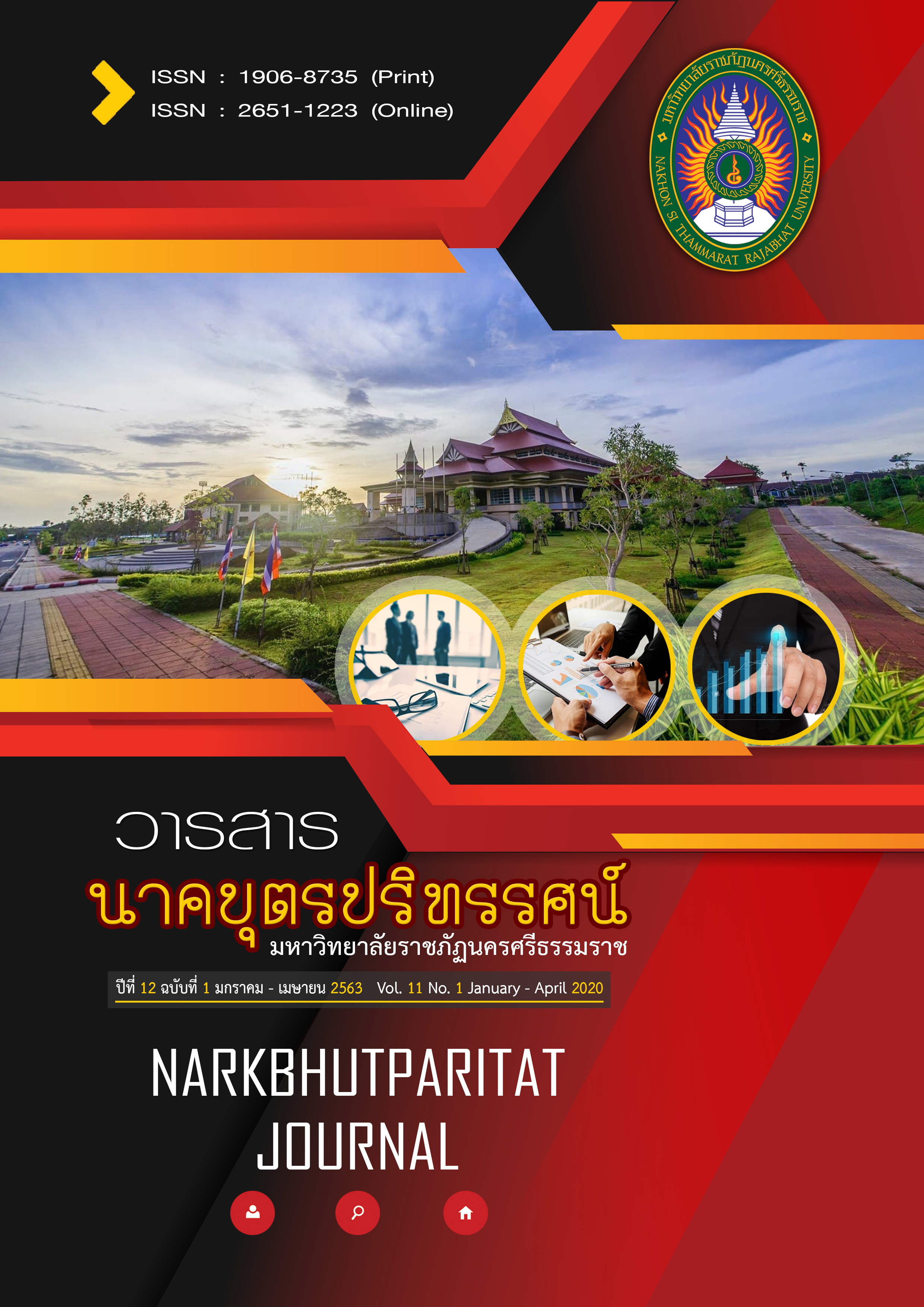Knowledge of Youth at Ban Koh Muk, Trang Province, Participating in a Youth Camp to Protect Seagrass and Aquatic Animals
Main Article Content
Abstract
Abstract
The objective of this research is to study youth’s knowledge regarding seagrass and aquatic animal breeding. The target group was young members of a youth group that were descended from small-scale fishers in the Lae Lay group in Thailand. It was found that, after participation in the youth camp, the students’ knowledge about aquatic animal breeding (71.67%) was higher than the criterion specified for passing (70%) among those aged 10-14 years old. However, their knowledge about seagrass and total knowledge (66.15% and 68.27%, respectively) was lower than the specified criterion of 70%. Moreover, their knowledge about seagrass, aquatic animal breeding, and total knowledge after participation in the camp was significantly higher than before participation in the youth camp at the 0.05 level. On the other hand, the knowledge about seagrass, aquatic animal breeding, and total knowledge (40.63%, 58.33%, and 47.44%, respectively) for those aged 7-9 years old was lower than the specified criterion of 70%. Moreover, their knowledge about seagrass, aquatic animal breeding, and total knowledge before and after participation in the camp did not differ significantly at the 0.05 level.
Article Details
References
Banks, T. (2000). Teaching-Leaning process: assess plan implement evaluate document. retrieved august 10, 2016, fromhttps://www2.ncdhhs.gov/dhsr/hcpr/pdf/principlesof adultlearning2007.pdf
Buckler, B. (1996). A Learning process model to achieve continuous improvement and innovation. The Learning Organization 3(3): 31–39.
Burns, R. M., Chandra, A. & Lara-Cinisomo, S. (2011). The Experience of Outdoor Education at Operation Purple Camp :Findings From a Sample of Youth Participants. Retrieved June 12, 2018, from www.rand.org/content/dam/rand/pubs/working_papers/ 2011/RAND_ WR815.pdf
Chitibud, M. (2011). Learning process management to enhancethegood characteristics; expert, and happiness at the lower secondary education. Bangkok: Division of Educational Research, Department of Academic Affairs, Ministry of Education (in Thai).
Economic and Social Affairs. (2004). World youth report. Retrieved 2016, July 30, from www.un.org/esa/socdev/unyin/documents/worldyouthreport.pdf
ERDOĞAN, M. (2011). The effects of ecology-based summer nature education program on primary school students’ environmental knowledge, environmental affect and responsible environmental behavior. Educational Sciences: Theory & Practice 11(4), 2233-2237.
European communities. (2006). Classification of learning activities –Manual. Retrieved 2016, August 10, fromwww.uis.unesco.org/StatisticalCapacityBuilding/
Fly, J. M. (n.d.). A Place-Based Model for K-12 Education in Tennessee. Retrieved 2016, July 22, from https://web.utk.edu/~markfly/documents/Place-Based%20K
Marine and Coastal Resources Research & Development Institute. (2015). Report of Survey and Evaluation on Status and Potential of Marine Resources and Coastal: Reefs and Seagrass, Year 2015. Department of Marine and Coastal Resources. Retrieved 2016, July 30, from https://marinegiscenter.dmcr.go.th/km/seagrass_doc07/#.V51DVfmLTIU (in Thai).
Niyomdecha, N. & Sabaiying, M. (2015). The Outcomes of participation in activities on public mind behavior on the environment among students: A Case studyof Phatthana Kansueksa Munnithi School, Mueang District, Satun Province. Journal of Liberal Arts, Prince of Songkla University, Hat Yai Campus 17(January-June 2015), 92-108 (in Thai).
Office of Overseas Programming and Training Support (OPATS) (2017). Environmental activities for youth clubs and camps. Retrieved 2018, June 12, from https://files.peacecorps.gov/
Office of the Council of State of Thailand. (1999). National Education Act of B.E. 2542 (1999) (In Thai). Retrieved December 16, 2012, from www.moe.go.th/edtechfund/fund/images/stories/laws/prb_study(final).pdf
Rae, K. & Pearse, B. (2004). Value of place-based education in the urban setting. retrieved 213, may 29, from www.environment.nsw.gov.au/resources/cee/raepearse.pdf
Tee-ngarm, O., Wongchantra, P. & Sachiyo, M. (n.d.). The Development of environmental conservation youth camping using environmental education process. Retrieved 2016, July 14, from https://905f96ef1c13bb23ee4b7b7e101e92a5aa9f12a6.googledrive.com
Thasenhod, P., Wongchantra, P. & Singsiwo, A. (n.d.). The Development of environmental education learning activities to conservation soil resources. Water and forest resources by the Scouts Activities. Retrieved 2016, July 14, from https://905f96ef1c13bb23ee4b7b
University of Waterloo (n.d.). The Canadian summer camp research project: examining the outcomes of the canadian summer camp experience. Retrieved 2018, June 12, from https://ccamping.org/wp-content/uploads/2012/11/CSCRP-Report-reduced.pdf
Watjinda, A. (2010). Team learning. Retrieved 2013, May 27, from www.hrcenter.co.th/column_detail.
Wirth, K. R. & Perkins, D. (2008). Learning to learn. Retrieved 2013, May 26, from www.macalester.edu/academics/geology/wirth/learning.pdf


